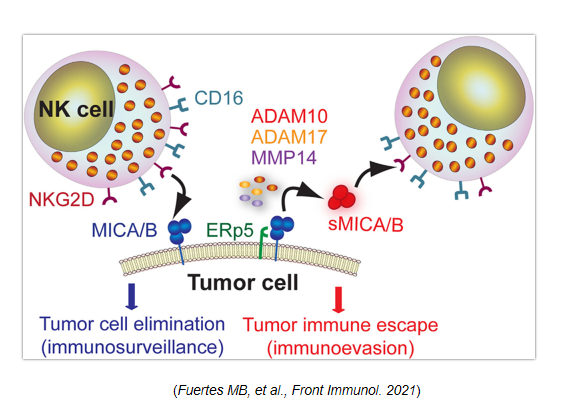B-hMICA mice
| Strain Name |
C57BL/6-Igs2tm1(MICA)Bcgen/Bcgen
|
Common Name | B-hMICA mice |
| Background | C57BL/6 | Catalog Number | 112161 |
|
Aliases |
MIC-A, PERB11.1 |
||
|
NCBI Gene ID |
100507436 | ||
- This gene encodes the highly polymorphic major histocompatability complex class I chain-related protein A. The protein product is expressed on the cell surface, although unlike canonical class I molecules it does not seem to associate with beta-2-microglobulin. It is a ligand for the NKG2-D type II integral membrane protein receptor.
- The human gene coding sequence was inserted to mouse Hipp11(H11) allele in B-hMICA mice.
- Human MICA was exclusively detectable on T cells, B cells and NK cells of homozygous B-hMICA mice.
- Application: For example, This product is used for pharmacodynamics and safety evaluation of cancer.
Mechanism of action

Dual role of MICA/B as target molecule for immunosurveillance by NK cells and as mediator of tumor immune escape.
- Immunosurveillance: MICA/B expressed on the cell surface of tumor cells can be recognized by NK cells through NKG2D and promote a cytotoxic response that leads to tumor cell elimination.
- Immunoevasion: MICA/B can associate with the ERp5 chaperone and, through a proteolytic cleavage mediated by ADAM10, ADAM17 and MMP14, generate sMICA/B that promote NKG2D down-regulation and impairment of NK cell-effector functions, thus facilitating tumor immune escape.
Protein expression analysis in spleen T, B and NK cells

Strain specific MICA expression analysis in wild type C57BL/6 mice and homozygous humanized B-hMICA mice by flow cytometry. Splenocytes were collected from wild type C57BL/6 mice (+/+) and homozygous B-hMICA mice (H/H), stimulated with PMA+ionomycin cocktail in vitro ( Cells were cultured in presence of PMA/I for 2 h, extensively washed, and subsequently cultured for up to 22 h) and analyzed by flow cytometry with species-specific MICA/MICB antibody. Human MICA was exclusively detectable on T cells, B cells and NK cells of homozygous B-hMICA mice.







